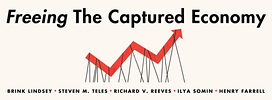I agree with much that Richard Reeves said in his compelling response essay – particularly on the pressing need to curb excessive zoning. Unfortunately, in one passage he seriously misconstrues my own position on the subject. Reeves writes:
You would think that the use of government power to rig markets in favor of the rich would have conservatives up in arms. But with honorable exceptions, not so much. Many trumpet the value of local democracy, and like Ilya Somin in this series, rely on “foot voters” (close cousins of Fischel’s “homevoters”) to provide the necessary corrective.
This is almost the exact opposite of my actual position. Far from relying on foot voters to constrain zoning, my view is that zoning needs to be constrained to make foot voting more feasible, especially for the poor and lower middle class. As I put it in my response essay, “[a]t least two of the reforms advocated by Lindsey and Teles could do much to expand foot voting: cutting back on licensing and zoning. Both are major obstacles to interjurisdictional migration, especially for the poor. The effects of zoning are particularly large…”
I have made similar arguments in greater detail in many previous publications (e.g. here and here). In a 2011 academic article on “Federalism and Property Rights,” I explained why foot voting is less effective at constraining abusive state and local policies that target immobile assets (most obviously property in land) than those that exploit more movable ones.
It is perhaps worth noting that I am far from the only conservative or libertarian policy expert to argue for curbing zoning. Many others have done so, going at least as far back as Bernard Siegan’s important work back in the 1970s. The idea that zoning should be severely restricted is in fact the dominant view among conservative and libertarian economists and property scholars – one that many on the left have come around to comparatively recently. Unfortunately, most politicians and activists in both parties have so far not heeded this growing expert consensus (though that too may be starting to change).
Editors’ Note: In a later response, Richard V. Reeves has acknowledged that his characterization of Prof. Somin’s position was erroneous, and it should be considered withdrawn.

